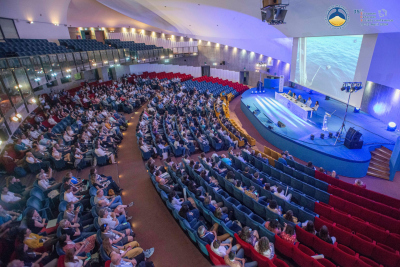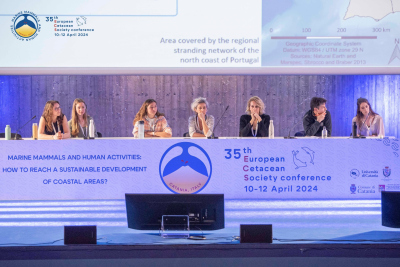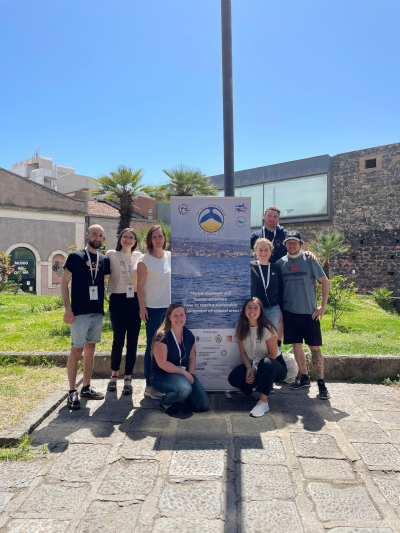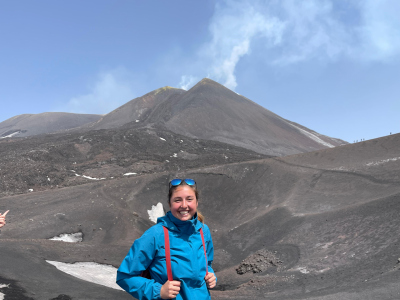- Graduate School GLOMAR
- PhD student reports
- Conference Reports
- Wiebke Homes
Wiebke Homes
Report of GLOMAR PhD student Wiebke Homes about her participation in the "35th European Cetacean Society (ECS) Conference" in Sicily, Italy organized by the Marecamp Association at the University of Catania from 10 to 12 April 2024
The 35th ECS conference focused on marine mammals and human activities and aimed to find solutions how to reach a sustainable development of coastal areas. As important flag species, apex predators and bio-indicators, marine mammals play a crucial role for the health of marine ecosystems. Many studies are shedding light on the correlation between demographic variations of cetacean populations (whales, dolphins and porpoises) and worsening water quality due to increasing anthropogenic pressures, emphasizing the need for targeted conservation management actions to preserve their habitats. With more than 500 participants (mostly from Europe), the range of topics was very diverse. Sessions focused on conservation, human interactions (fisheries, traffic and noise), anatomy and physiology, health, acoustics, new technologies, genetics and evolution, ecology and habitat use, ecological modelling and behavior. In total, 42 oral presentations and 39 short talks were given and more than 300 posters presented.
Prior to the start of the conference, two days of workshops offered fruitful exchanges on (among others) mapping human activity, advances in eDNA for monitoring, the impact of cetaceans on climate and on setting up a whale poop bank network (yes, you read that correctly). Due to time constraints, I was unfortunately unable to attend these workshops but I have heard that they were very successful in terms of outputs, networking and learnings. On Wednesday, 10 April, the conference officially started with an opening ceremony and a keynote by Frances Gulland, who highlighted the urgent need for monitoring and conservation of three of the most threatened cetacean species worldwide: the Vaquita, Mekong River Dolphin and North Atlantic Right Whale.
This was followed by the first two sessions on Conservation, in which I presented my PhD research on the governance of marine protected areas (MPAs) and harbour porpoises in the German North Sea. Since I was one of the very few researchers not focusing on pure natural sciences, I didn’t expect much exchange on my methods or frameworks but I was very pleased that there was a lively discussion after my presentation on different conservation approaches for the protection of harbour porpoises in different regions of Europe. I learned a lot about how MPAs in other European regions are managing populations, especially with regard to human interferences of varying degrees. During the course of the other sessions over the next couple of days, it became evident that there is still a lot unknown, particularly about other whale and dolphin species that are less common.
During the poster sessions I was able to network with other early-career researchers working on ocean literacy and citizen science for marine education, which is very valuable for the next phase of my project in the coming years. I also got to explore and talk to marine scientists from differing disciplines, which really sparked my curiosity for marine mammals even more. For example, I was able to listen to individual vocals of a killer whale herd off the coast of Norway, and learned that almost all Southern Hemisphere fin whales are right-biased and exhibit clockwise directional lunging when feeding. Isn’t that cool?
Overall, the conference was a full success! Every day the scientific sessions were accompanied by social events in the evening (student dancing parties, a movie night and a banquet), which added a lot of fun to the intense sessions during the day. I stayed in Catania for the weekend and was able to explore the surroundings above and below water with both my old and my new friends and colleagues.
I would like to thank GLOMAR for providing me the opportunity to attend the ECS and to become part of the European Cetacean family, which is going to add substantial value to my PhD work.






